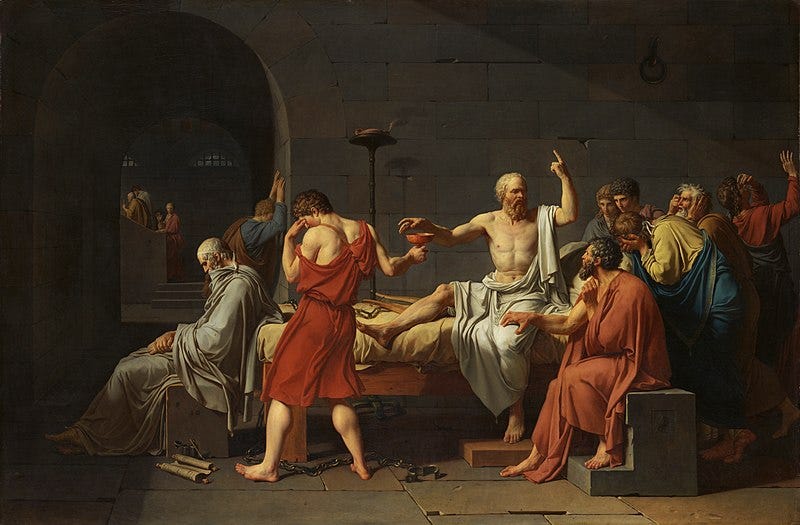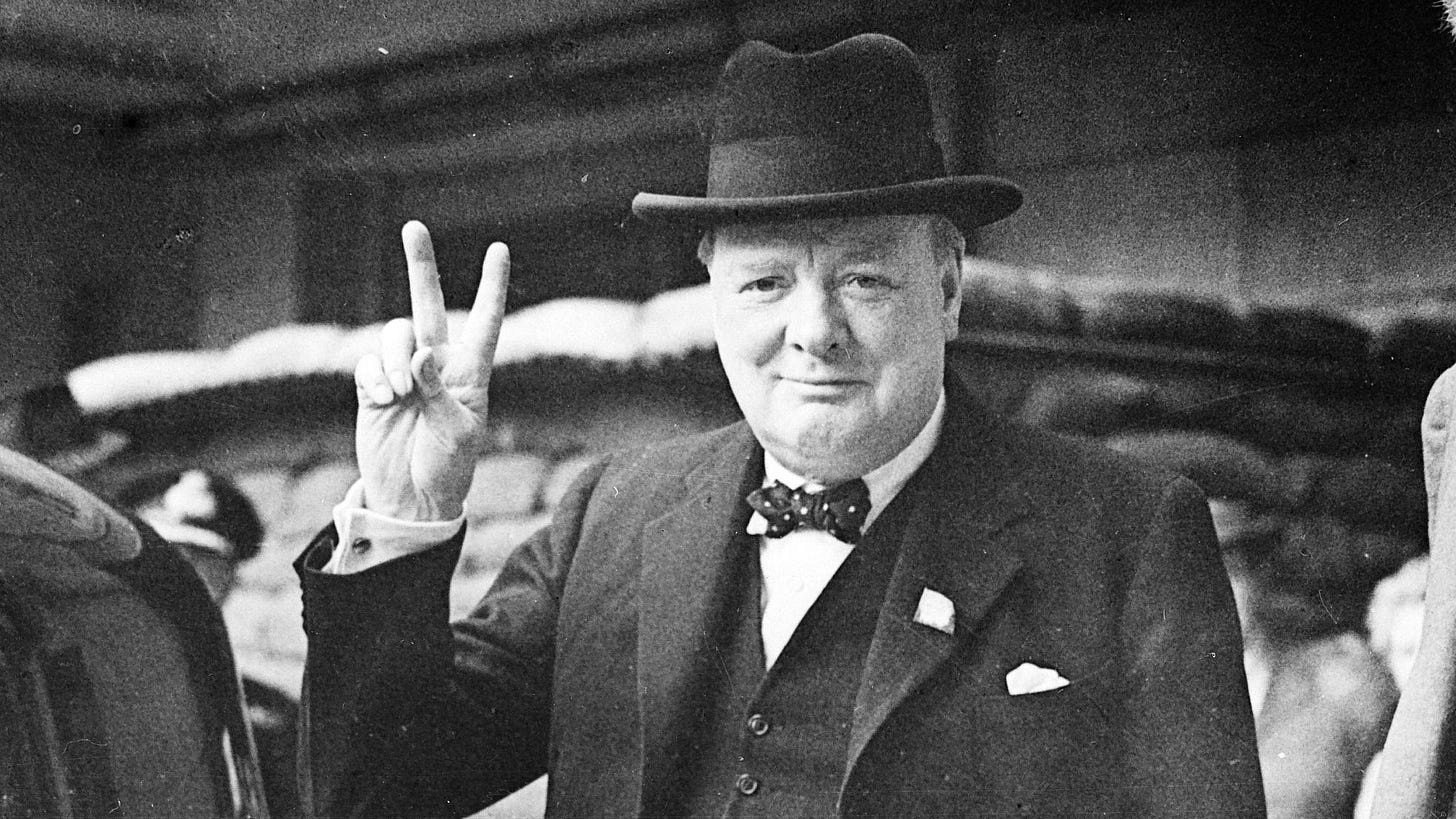The Space Between Correctness and Rightness:
A Vaguely Philosophical Discourse for the Nerds Who Read The Zionist Voice
(The Death of Socrates, Jacques-Louis David, 1787)
There’s a difference between being correct and being right.
Something is correct if it agrees with a previously established truth.
Your SAT answer was “correct” because you chose the answer that the test makers had previously established was the true selection.
It is the test maker who determines the correctness of your answer, not you.
To be right is more complicated.
Something can be correct without being right, and something can be right without being correct.
Something is right when it agrees with the truth of nature, whether or not its truthfulness had been previously established.
For example, the Prophet Jeremiah was “right” that the people of Israel would return to the land after their 70 years in exile.
Or, Churchill was “right” in 1938 that Adolf Hitler was hell-bent on warfare.
Unfortunately for Churchill, although he was prophetically right, he was politically incorrect.
(Churchill puts up the “V is for Victory” symbol)
The politics of his time were the politics of peace at any cost, and those who believed in those politics were so convinced of its previously established truth that they purged any voices that spoke to the contrary.
Over time, that which is right usually becomes that which is correct because a society cannot afford to live against the truth of nature.
That society will either adopt the “right” position, or it will kill itself in order to maintain its false sense of “correctness.”
It is very difficult to challenge the previously established authorities and truths of your time.
It is like confronting a teacher about an answer they marked wrong and trying to prove to them that they were wrong.
One of two things usually happens: you were either wrong the whole time and you end up looking like twice the fool, or you prove that the teacher made a mistake, which causes them to lose the respect of their other students, which may create a rift between you and them which you will not be able to escape from.
That’s why most students don’t challenge their teachers’ authority, even when the teacher is obviously wrong.
Socrates was right about the philosophical approach to life. The men who put him to death almost immediately regretted it, and, within one generation of his execution, there were schools of philosophy all over Greece.
Chamberlain was the most feted politician in the world in 1938. By 1948, no one held any of Chamberlain's work in any esteem.
(Chamberlain’s famous “Peace in Our Time” Speech)
When people talk about “the judgment of history,” or the like, they are usually referring to the way that we judge past generations for having martyred people who were politically right while celebrating those who were politically correct.
In every generation, there are counter-cultural figures who expose the issues underlying their current society’s situation. It is usually the generation following theirs that vindicates them.
There are, of course, levels to rightness and wrongness in the world.
Returning to the teacher example, on a fifty question test, the teacher might make one, maybe two mistakes. It is not like they are making glaring mistakes on every single test.
It is not like the entire test was wrong – if it was, that teacher would need to be fired.
We are living in a world of political correctness.
A friend of mine recently told me a story about meeting an old Soviet Jew who said, “you know, I’m very progressive. But the whole political correctness, it just seems very Soviet to me. This is the party line – you say these lines, you are correct, you say something else, you lose your job.”
I will admit, I was a little scared to write this essay.
Although I do not believe that anything I am saying is wrong, nor offensive, nor even politically incorrect, I am aware that even challenging the idea of political correctness makes certain people reach for their Stasi pagers.
But the forces of political correctness are so strong that people will defend it for no other reason than they think they’re supposed to.
But political correctness was wrong.
It was dead wrong about the American people and this election, and if an intellectual regime can be so wrong on something like that, one must question its very existence.
Now, before I go further, I have to do some throat-clearing:
What follows are political observations, not opinions. I have been studying American politics so deeply for so long that, to be honest, I am no longer invested in who wins anymore.
I am invested in understanding why they won.
As for my credentials as a political observer, I will note that I have predicted the results of every major election that I have been alive for, and my piece de resistance this year was calling Trump sweeping all seven swing states.
There are two reasons I knew he would do that.
The first is that, on the last day to make political donations, I received two text messages from the Democrats: the first one offered a 600% match on my donation, the second one offered a 700%.
Now, my first question was, if you are offering 600%, is it really a match? But, given how anti-dictionary the left has been of late, I decided to let that one slide.
If they were that desperate to get out donations, and they had that much money available to match, that meant that the Democratic base was way too top heavy.
Whoever was giving the money to make 600 and 700% matches had to be fantastically wealthy, and the party had to be absolutely desperate for engagement if they were offering that much.
The second reason I knew Trump would sweep was based on a little social experiment I ran.
Any time I talked to a Kamala supporter who believed she was going to win and win handily, I would offer them a bet, even money.
I told them I was so confident that Trump would win that I would bet $5000 that he swept all seven swing states, even money.
And then I would watch their eyes.
Something I learned a long time ago is that people live in their own fantasies right up to the point that money is on the line. Then, they start to think.
I ran this experiment on about 5 people.
Four of them rejected it immediately. From their eyes, I could see that they were scared.
So I offered them an easier bet, one based on one of the political changes the progressive movement has been trying to make for so long.
I offered them the same bet but for the popular vote.
People who had been walking the politically correct party line believed that the only reason Trump could win an election was because of the Electoral College – that the people would never vote him in.
Before I made the bet, everyone was joyously talking about how much they thought she would win by and which plan she would take to the White House.
It brought me back to 2016.
But Political Correctness was wrong.
Not only did Trump win the election, not only did he win the popular vote, not only did he sweep the swing states, but he also got the House and Senate.
If the Democratic Party were a sports team, it would be time to fire the coach, trade all the players, and start rebuilding.
The question is, will they?
Political correctness is a losing political strategy.
What perhaps started as a well-meaning attempt to be more kind towards people with differences has gotten out of hand, to the point where it will soon endanger the very people it was trying to protect.
The good and healthy part of “political correctness” really is not political at all – it’s about respect.
The goal of any human relationship should be mutual respect, and if you and I come from different cultural backgrounds, we will have different understandings of what respect means, so if you really want to show someone respect, you ought to know or at least try to know something about what respect means to them.
The goal of political correctness is for people to change how they behave towards one another, but the mechanism through which it tries to make that change is politics, which is an absurdity of absurdities because there is literally nothing that politics makes better.
It is the worst thing that we have ever created – why would anyone try to use it to teach others about mutual respect?
I believe with a perfect faith that America is the great melting pot of the world, that we are the first nation ever created who was bound by shared beliefs and not shared blood, and I believe that the people of this country are good people who respect hardwork and resilience.
I believe that when my children grow up, we will not be talking about reparations any more, or the glass ceiling, or homophobia, or antisemitism, or wokeness – I believe we will move past all of those things.
Not because we were being politically correct but because we will be spiritually right.
At the end of the day, most Americans want the same things.
When I was more active on Instagram, there was a trend I found really beautiful.
Basically, there would be a split screen, and on one screen would be a real country white guy, and on the other screen would be a real country black guy, and one of them would say something like, “man, how come us country white folks and black folks have been fighting each other so much. All I want to do is watch football, drink some cold beer, smoke a brisket, and not get bothered by the police about my guns,” and the guy in the other screen would just be emphatically agreeing.
To me, what I loved most about those videos, was imagining showing them in a DEI seminar.
Two men, about as un-PC as they come, bridging the racial divide through their shared love of… American culture and values?
Oh my goodness something like that might set the entire state of California on fire!
But those two men are spiritually right.
They are looking to build a human relationship and connection with their countrymen.
It’s 2024, even rednecks don’t care anymore.
I have always posited that G-d has a great sense of humor, and I feel that G-d is really cooking up something special here.
I have a sneaking suspicion that the first woman president will be a black redneck with traditional values – not quite a hunch yet, and certainly not a prediction – but a suspicion.
“Political correctness” is a form of social coercion that attempts to scare people out of speaking their mind for fear of social repercussions.
The repercussions of telling people that Kamala was going to lose was that they called me mean names and insulted my intelligence. They probably also said nasty things behind my back, but that really has nothing to do with me, that’s between them and G-d.
I know that I’m no fun to have at a dinner party because I’m the guy who’s going to tell everyone that Rome is burning while they just want to keep playing the lyre.
And how many people on the left have been effectively silenced by political correctness?
Well, let’s put it this way: Kamala Harris was the first democratic nominee selected without visiting a single electoral delegate.
And the Democrats, whose name literally refers to “democracy” – a government by the people – did not care at all.
The voters said nothing, the delegates said nothing, but, what I think is most demonstrative of how deep this has gone, all of the presidential contenders said nothing.
Gavin Newsom, the prettiest governor in the country and an obvious presidential hopeful, did nothing. He just bit his tongue while Kamala was anointed Biden’s chosen successor.
Now, personally, I think Newsom has done more harm to California than wildfires, but there should have been a competition. Obviously.
But there wasn’t because no one said there should have been, and that is because political correctness is used to enforce silence.
The strange thing about PC culture is that it is almost impossible to pinpoint its origin or who it is actually serving.
Who benefits most from people not feeling safe to speak their minds?
It is certainly not the vulnerable people that PC culture is trying to protect because it only enrages the public and makes them targets.
Most trans people I know are very comfortable talking about the issue of transwomen in women’s sports – that is an obvious flashpoint that needs a solution. Good faith actors on both sides, the side defending trans women’s rights to compete and the side defending biological women’s right to a fair competition, understand that both sides have legitimate arguments, and a compromise needs to be reached.
However, by refusing to let anyone talk about the issue, we have just let it fester and metastasize to the point where now records are being broken and people are only getting angrier.
If I had to wager about where PC culture is coming from and who benefits from it, I would wager that it comes out of the universities where you have far too many people talking about things and far too few actually doing anything, and I would wager that the people who benefit from it the most are academics who are somewhat poor debaters.
You may have noticed that Americans do not have public debates anymore.
The most proximate reason is that people are scared they may say something cancellable on a live recording, but I think it is the other way around – people who did not like having debates created cancel culture to hide the fact that they cannot debate.
That’s why CBS censured Tony Dokoupil for asking Ta-Nehisi Coates a reasonable question.
When I would challenge antizionists to debates on social media, they would usually block me, but sometimes they would also report me so my account would be taken down for 12 hours.
Of course, all of these social media influencers and what not are downstream of people like Coates – they read the work of a man who will not be challenged on it, they repeat, more or less, what they understood from the work, they get challenged by someone about it, so they defend it the way that Coates and CBS did – by cracking the politically correct whip.
The saddest thing about all of this is that I am actually on board with the radical acceptance and mutual respect that PC culture purports to produce – I just think they are wrong about how to do it. Very, very wrong.
I wish someone would debate me about these things, but I’m not holding my breath.
Until then, I will just keep on focusing on trying to be as right as I can be and remind myself that people would not be trying to stop me from using my voice if they didn’t think it was dangerous, and that is a huge compliment.
~
Spread Love, Spread Light,
Am Yisrael Chai




